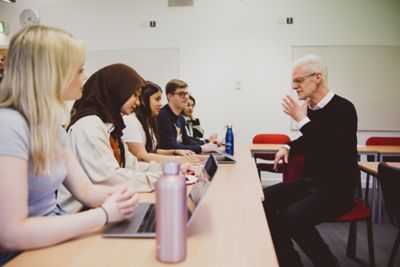Franklyn Ogosi, Foundation Year Alumni
Franklyn talks about his unusual route into higher education and finding the confidence to believe in yourself.

.jpg?fmt=jpg&qlt=85,0&resMode=sharp2&wid=800)
Franklyn, an alumni in Theology and Religious Studies
"I took a somewhat unconventional route into higher education. When I was 18 I started a foundation science course at a different university, and I hated it! I'd chosen that course because I didn't have great A-level results, but my best grades were in science and everybody told me 'education is key, go to uni and get a job in a STEM subject'. I believed that by doing that I'd be able to earn plenty of money, get myself a great life and have some fabulous holidays. So I thought, I'll get through the degree, get through the job and then enjoy the rewards. But I ended up failing that first year so I made the choice to leave the course and spend some time deciding what I really wanted to do."
I followed my interests by going back to square one and exploring what I was passionate about. I took a two-year course in music technology and then interned at a local church. It was there that I had a conversation with my mentor who asked if I'd ever considered returning to university. This was on 13 January, by 15 January I'd made my application to Nottingham.

Starting uni for the second time was nerve wracking, both socially and academically. I'd never felt very academic so was scared about writing essays and concerned I might not be up to scratch. But the foundation year was so useful. I actually needed that year to bring me up to speed and help improve my confidence as well.
The foundation year is a learning year and something I discovered early on is that when you learn to do something new you have to get over the fact that you're inevitably going to get things wrong and mess up somewhere along the way.
The very first module we did in the foundation year was Critical Thinking and Reflective Learning and that helped me to get an understanding of what a university essay looks like, what the process is and the kind of content you need to reference. So after the first semester, I felt a lot more settled and a lot more confident that I could do it.

The foundation staff were amazing, they really stand out as they're the ones who take you under their wing and help you grow so much.
Doug Ingram and Peter Watts were definitely part of the reason why I've gotten this far, they really helped build me up academically.
The thing I'm most proud of over my time studying at UoN is overcoming the issues I had around my self-confidence and trusting my abilities. Now, I feel a lot more confident in myself, my intelligence and my academic capabilities. My route into higher education may have been longer and a bit more zigzaggy than others but it's worked out well and made me into the person I am today. Even with all these little bumps in the road so I'm proud of what I've overcome and that I managed to achieve a first-class degree as well.
"From the moment I applied for the course, my intention was always to pursue Theology and Religious Studies. I deliberately chose to attend a secular uni rather than a bible college because I wanted to experience a range of opinions and teachings, to experience different views of the bible and explore other religious texts too.
Theology and Religious Studies was a great course, I enjoyed it being a small cohort because I got to know everybody, we would all do things together."

The Theology and Religious lecturers were great, you can honestly tell that they're really really passionate about what they do and they really want to do everything they can to help you succeed.
Conor Cunningham was my dissertation supervisor and he was great at challenging me and pushing my boundaries. I felt very unsure and he'd say 'you know you are smart enough because you're here, you made it this far off, you can do it'.There's also Sara Parks, everybody loves Sara, she taught us the New Testament parts of the course.
"I now work for the university in their pre-16 Outreach team. This means that I work with year 7 - 11 pupils from local schools and help them discover what what Higher Education could offer them. Sometimes that's me visiting their schools and sometimes they come here for campus visits.Often the schools we work with have higher than average rates of socioeconomic disadvantage and we're there to help bridge the gap and let those pupils know university is an option them. We aren't there to persuade them into a degree, often pupils tell me they aren't interested in university or want to do an apprenticeship, that's great too.I really enjoy being part of something that could be a turning point in these young people's lives and I love helping them build that confidence to believe they can be whatever it is that they want to be."
"Definitely research. Reading skills. My job is dependent on presentations and standing up and delivering to kids so the presentation module gave me skills I'm definitely using today. Also teamwork skills, effective communication and active listening skills."

I would say it's being in a situation where you wake up and think 'I enjoy doing this', you may not have your ideal job but you're on your way to it. That is success.